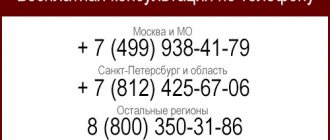Example of an eviction notice from a residential premises
Tumanova Victoria Yuryevna
address: 140412, Moscow region,
Kolomna, st. Partizanskaya, 29-48
from the owner of apartment No. 48, located
at the address: Russia, Moscow region,
Kolomna, st. Partizanskaya, 29
Tumanov Konstantin Fedorovich,
143505, Moscow region,
Istra, Ostrovsky Prospect, 43-5
You are a user of apartment No. 48 at the address: Russia, Moscow region, Kolomna, st. Partizanskaya, 29 on the basis of a court decision recognizing the right to use the above-mentioned residential premises. The indicated apartment belongs to me by right of ownership on the basis of a gift agreement dated August 10, 2005 (certificate of registration of rights, series AL No. 3546687).
In accordance with Part 4 of Art. 31 of the Housing Code of the Russian Federation, upon termination of family relations with the owner of a residential premises, the right of use for a former family member is not retained, except, inter alia, in cases where the right of use is retained on the basis of a court decision. At the same time, in accordance with Part 2 of Art.
As I learned, apartment No. 48 at the above address is not being used by you for the purpose established by the court: for living. You rent it out on a daily basis, which is confirmed by advertisements on the ABiDo website and information from neighbors. In addition, based on a complaint against neighbors, the local police commissioner conducts an investigation into violations of public order.
I notify you of the need to eliminate the violation of the court-established procedure for the use of residential premises - apartment No. 48, located Russia, Moscow region, Kolomna, st. Partizanskaya, 29 within 10 calendar days from the date of receipt of this notice. Otherwise, I will be forced to go to court with a claim for eviction.
August 30, 2020 Tumanov K.F.
Pre-trial claim for eviction
» » » The document form “” belongs to the “Claim” section. Save the link to the document on social networks or download it to your computer. TO: ________________________________ ________________________________ ADDRESS: ________________________________ FROM WHOM: ________________________________ ADDRESS: ________________________________ CLAIM for pre-trial settlement of a dispute I, ________________________, am the tenant of a room with an area of ___ sq. m.
m. in a communal apartment at the address: ______________________, which is confirmed by the Social Tenancy Agreement No. ____________ dated ___________. In addition to me, my minor children are registered and live in the specified room: _______________________, ___________, _____________________, _____________.
R. A room with an area of ____ sq. m. and a room with an area of ____ sq. m.
occupied by ______________, _____________, _____________ and ____________, although legally only ____________ and ___________ are permanently registered in these rooms. I am against the residence of the following persons in the apartment in question: _______________ and _____________ This is motivated by the fact that these persons violate the rules of living in the residential premises and cause me obstacles in comfortable use of common areas. ____________ has repeatedly expressed insults, humiliations, and condemnations of my personal life towards me.
How to draw up and send a warning, demand and notice of eviction from an apartment
» » Every citizen of the country has the right to housing by default and is guaranteed by the Constitution of the Russian Federation.
In addition, ____________ discusses my personal life with third parties and makes scandals with me without reason.
However, it often happens that this right is lost for various reasons. In this case, it becomes necessary to evict a tenant who has violated the living conditions. Such a decision requires documentation. In the article we will tell you what a warning, demand and notice of eviction from an apartment are, and we will also provide sample documents. Contents You cannot simply evict a person from an apartment.
This requires compelling reasons. The reason for eviction may be the following situation:
- the residential property is in disrepair;
- the house is planned to undergo major renovations in the near future;
- changing the purpose of the premises;
- other reasons.
- use of living space other than for its intended purpose (for example, equipment in a warehouse apartment);
- transfer of property rights to another person;
- failure to make rental payments under the agreement;
However, one unfounded reason is not enough. The existence of a reason must be proven.
Any documents related to the case can be used as evidence.
For example, this could be an order from the administration, written complaints from neighbors, etc. But even in cases where the eviction is well justified, the tenant must be given notice of the upcoming eviction. Evicting a person without a properly issued notice is arbitrary.
Similar actions
What is forced eviction?
This is a compulsory measure, which is intended to free the living space from the offender along with his family members.
It can be carried out either with or without providing an alternative.
It is always carried out only by authorized bodies (FSSP) by court decision.
No private person can forcibly evict a person from an apartment. The right to housing is enshrined in Article 40 of the Basic Law of the Russian Federation.
When to file a notice to vacate a residential property?
The grounds for preparing a written document are:
- the intention of the homeowner to terminate the right of third parties to use his residential premises. As a general rule, when family relationships are terminated, the right to use the residential premises of the former family member of the owner is terminated. Then such citizens must vacate the premises within the period established by the owner
- the intention of the homeowner to terminate the right of use by persons whose right is established by a court decision (on recognition of the right of use, recognition as a member of the owner’s family), on the basis of a testamentary refusal. In this case, an eviction notice is prepared when the user uses the apartment for other purposes, violates the rights and legitimate interests of neighbors, mismanages the living space, and allows its destruction. The user warns of the need to correct deficiencies in a timely manner. And if they are not corrected, you can file a claim
- eviction of a temporary tenant. Such persons must vacate the premises within 7 days from the date of notification by the tenant (unless another period is established by the tenant)
- eviction of tenants under rental and sublease agreements
- requirement of a bailiff under a writ of execution within the framework of enforcement proceedings.
General grounds for discharge
Yes, Art. 103 of the Housing Code of the Russian Federation establishes:
| The reason that leads to the discharge of citizens from houses of a specialized fund is the early termination or termination of the rental agreement for residential premises | If the tenants refuse to voluntarily leave the apartment, then eviction is carried out by court decision. The same norm in part 2 establishes a list of citizens who cannot be discharged from official housing, as well as dormitories, without the provision of other living quarters |
In Art. 133 of the RF Housing Code mentions:
| On the reasons for the eviction of members of a housing cooperative | they must vacate the premises if they have not paid the share contribution in full and were excluded from the composition |
Dear readers! The article talks about typical ways to resolve legal issues, but each case is individual. If you want to find out how to solve your particular problem , contact a consultant:
8 (800) 700 95 53
APPLICATIONS AND CALLS ARE ACCEPTED 24/7 and 7 days a week.
It's fast and FREE !
In accordance with Art. 35 of the Housing Code of the Russian Federation, the following may be evicted from residential premises:
| Citizens who occupy it by court decision or on the basis of a testamentary refusal | in the event that they use the premises for other purposes, violate the rights of neighbors, or cause harm to the apartment by their actions. |
Art. 32 of the RF Housing Code states:
| The owner may be evicted from the apartment due to the demolition of the house | at the same time he receives compensation in kind or cash. |
The process of recognizing a house as unsafe and subject to demolition is approved:
| By Government Decree of January 28, 2006. No. 47 | after the relevant verdict is made by the interdepartmental commission, the procedure for notifying citizens, as well as the process of providing them with fair compensation, must be followed |
| The same basis for exclusion from an apartment applies to a tenant under a social tenancy agreement (Article 86 of the Housing Code of the Russian Federation) | with the only exception that he cannot choose the form of compensation. He is always provided with another living space corresponding to the previous one in terms of total area. |
The reason may also be failure to pay utility bills if the debt has accumulated over 6 months. This is stated in Art. 90 Housing Code of the Russian Federation.
This rule applies exclusively to tenants of municipal housing. They will be provided with other living quarters.
It must meet certain requirements:
- be located in the same administrative entity;
- be suitable for habitation under current regulatory conditions.
In case of discharge for non-payment, the area of the new premises is calculated according to the provision standards upon moving into the hostel.
Video: 8 reasons for eviction from an apartment
Grounds and conditions
The Civil Code of the Russian Federation speaks about this, specifically Article 293. According to it, a citizen can be “asked to leave” if he:
- systematically violates the rights of those living in the neighborhood, creates a threat to their safety and living comfort;
- uses housing for non-residential purposes (for example, equipped an apartment as a hairdresser);
- lost the right to use the apartment as a result of the termination of family relations;
- lives in a house that is officially recognized as dilapidated or in disrepair;
- does not pay for provided utilities;
- there is a mortgage debt and the citizen does not seek to repay it;
- moved in illegally;
- arranged an illegal redevelopment.
Read more about the grounds for eviction of registered citizens who are not owners here.
Contents of the document
It starts with a statement of claim.
We suggest you read Where to contact if the ventilation in the apartment does not work
The document is submitted, in accordance with the Civil Procedure Code of the Russian Federation, at the location of the defendant.
Mandatory in the claim
- full name of the court;
- passport information of the evicted applicant;
- requirement to evict (specify legal norms);
- why do you think that the specified person no longer has the right to stay within the walls of the house;
- what pre-trial measures were taken and what results they produced;
- what papers do you use to support your claim?
We recommend that the eviction notice be in writing and delivered to the owner either in person (you can draw up a Refusal Signature Certificate) or with a postal return receipt. These documents will be useful in court as evidence in a civil case. After all, a person can only be forcibly evicted through a judicial procedure.
The document will be given legal force by the following information:
- about the notification recipient
- about the sender of the document
- Name
- reason for eviction: termination of the right to use, violation of rights and legitimate interests, use of the premises for other purposes, etc., with references to regulations
- the period within which the premises must be vacated
- date and signature.
It is not difficult to draft an eviction notice, unlike the procedure for judicial review of such categories of cases.
Presentation
After drawing up the notice, you must hand it to the addressee. This situation is a little more complicated because many residents ignore this fact.
How to give:
- Registered letter - a document is sent with a notification and a list of all attached documents, two copies are saved, which remain with the sender and the recipient.
The sender also retains a payment receipt and tracking number, which serves as proof of notification to the tenant. - Delivery in person - for this it is better to make a copy of the document; upon delivery, the addressee must sign and date when he received the notification. It happens that residents refuse to sign a document, then it is better to take witnesses with them who, if they refuse to accept the notice, will record this fact.
On what basis can a person be evicted from an apartment, watch the video:
The best option for delivering notice is registered mail. The sender will know exactly whether the tenant refused or received it, since not only he, but also the post office employees will have all the data.
An eviction notice is an official document that contains the reason for the decision, which is supported by documentation. You should not ignore the receipt, since the owner has the right to seek help regarding its execution from higher authorities.
From council housing
This means the early termination of a social tenancy agreement, which is usually concluded on an indefinite basis.
This issue is regulated by Art. 83-84 Housing Code of the Russian Federation.
It is understood that the person being evicted is obliged, after the court decision on eviction from the residential premises has entered into force, to vacate the occupied premises together with his family and belongings at a set time and hand over the keys to the municipality.
Both the municipality, the State Housing Inspectorate and even private individuals can initiate eviction from municipal square meters.
As already mentioned, they can be evicted either with or without the provision of an alternative in the form of other housing - comfortable or not.
A comfortable option will be provided if, so to speak, it is not the person’s fault in the grand scheme of things that he is being asked to leave his native land - for example, a building goes to the state or a religious community if it is declared officially unfit for habitation.
In other cases, they usually provide a room in a dormitory.
Alternative housing is not provided if a person destroys an apartment (this also includes illegal redevelopment, and there must be a threat of collapse), endangers the life and health of other residents, violates their rights, or renders the apartment uninhabitable. This also happens in the event of deprivation of parental rights.
We invite you to familiarize yourself with Expulsion and deportation from the Russian Federation. Cancellation of deportation
Find out whether you can be evicted from your only home in our article.
What documentation is prepared at the beginning of the procedure?
Let's consider the procedure for eviction from an apartment by court decision. This question is very complex and takes a lot of time. To begin with, the initiator tries to “reach out” to the offender using letters.
All notifications must be sent by registered mail with notification and a list of attachments, handed over to the addressee personally against signature.
Warning
Warning about eviction from residential premises - sample
This is a document in which the owner makes it clear to the tenant that his lifestyle does not suit him, indicates unacceptable violations and necessarily stipulates a deadline for their elimination.
In principle, this can be done orally, but then in court you will have to prove that the owner gave the negligent guest a delay to correct the situation.
Requirement
Request for eviction from residential premises - sample
There are two types: notification and compulsory.
In the first case, for example, the owner decides to sell the apartment or simply notifies that the tenant’s registration is coming to an end, and he is not needed for a new term.
In this case, it is also necessary to provide a period so that the expelled guest can take care of resolving the housing issue.
A compulsory demand is issued when the owner, say, becomes aware of unacceptable violations and he sets a condition: eliminate the violations or get out of the apartment.
Sample notification
Notice of eviction from an apartment - sample
It contains an indication of the reason and regulatory document (for example, a court decision on eviction from an apartment), according to which the tenant is asked to vacate the premises within a specified period.
In this case, you will need to provide the following documents:
- general civil identity card;
- social tenancy agreement or title papers;
- state duty check (it is 300 rubles);
- extract from the house register;
- a copy of the financial and personal account;
- evidence that the demand to evict is legal.
While the case is being considered, two months will pass - this is Art. 154 Code of Civil Procedure of the Russian Federation. Another two will be taken by making a decision and filing a cassation complaint (Article 119 of the same code).
According to Art. 428 of the Code of Civil Procedure of the Russian Federation will take another month to issue a writ of execution. And another two months are allotted to the bailiffs for the process of expelling the offender with all his “belongings” (Federal Law No. 229-FZ).
The deadlines may increase - failure of the responding party to appear at the meeting, complaints, requests to postpone, etc. also play a role here.
So it turns out that not just a registered tenant who has no rights, but even the authorized owner of the apartment can be evicted if he does not comply with the requirements for using the apartment or creates a threat to other residents of the house.
We invite you to read: Is it possible to live in non-residential premises according to the law in 2020? What will happen?
And if this is exactly what you are facing, you need to contact a competent lawyer as quickly as possible, who will not allow an unfair decision, and in general will reduce the risk of eviction to the street to a minimum.
Unpleasant procedure
It is impossible to evict a person living in an apartment without a trial, especially if this is one of the family members who has the right to live in this area. The owner of a residential premises or part of it cannot be removed at all. The solution to this difficult issue is possible without providing another option for living space or with the provision.
Without providing a new place of deployment, there is a chance to remove the following categories of residents:
- those who allowed rent debts to accumulate (debt-related evictions);
- persons causing harm to residential premises, destroyers;
- citizens who are impossible to live next to because of their disgraceful behavior (disorderly conduct, drunkenness, scandals, etc.).
There can be many different situations - divorce of spouses, when relatives of the other live on the property owned by one of them, or if an apartment was purchased, and family members of the previous owner are registered and living in it, etc.
Forcibly - we file a lawsuit
In any case, eviction is possible only based on the results of the court, so the process begins with preparation for the trial. This is a hassle, of course, but you should know that the owner must complete the following steps before going to court:
- verbally explain to the tenant who is about to be asked to leave that he is urgently asked to move out, and give him a period of, say, a week, if there is no reaction, begin to act differently;
- warn the citizen in writing about your intentions and offer to move out, check out, stop destroying housing or doing other things that interfere with other people (it is advisable to hand over a warning against signature);
- complain in writing to the property owner or landlord about the evicted citizen;
- contact the local police officer or police station if necessary.
You also need to stock up on witness statements from neighbors or other family members. The more evidence there is, the better.
Having made sure that the problem cannot be resolved peacefully, we begin to draw up an application to the court.
We draw up a claim correctly
The statement of claim is drawn up as follows:
- indicate the name of the court where the claim is filed;
- write in full the full name of the plaintiff, address, contact telephone number, and the same regarding the person of the defendant;
- the narrative part must contain a detailed story outlining attempts to resolve the problem pre-trial, all the circumstances and a clearly formulated request to the court;
- All attachments should be listed and signed and dated.
A request, or demand to the court, can be not only the forced eviction of a citizen, but also compensation for moral damage , or a requirement to carry out repairs to neglected housing, etc. It should be understood that the issue of deregistration in a statement of claim should not be raised as a requirement, The court does not deal with registration issues.
We should not forget about paying the state duty without attaching a document confirming the fact of payment, otherwise the claim will not be accepted for proceedings.
Attaching an extract from the house register or EZhD is mandatory . If the apartment is owned - title and title documents. If not, a social contract. hiring (if any), if not, a copy of the order. When you evict your ex-spouse, you need a divorce certificate.
Here.
Jurisdiction of cases
A statement of claim for forced eviction must be sent to the court of general jurisdiction at the location of the living space.
State duty
Since the claim is filed in a court of general jurisdiction, and the meaning of the claim is not material, the fee is 300 rubles . (Clause 3, Clause 1, Article 333.19 of the Tax Code of the Russian Federation).
Deadlines
For housing issues, the statute of limitations is set at 3 years. A period of 30 days is allotted for court proceedings; if requests are needed to any organizations, then this will take time, so the trial may last another 30 days.
This means that the process must be completed within 30 to 60 days.
Notification
In any case, it is a procedural necessity to warn the person being evicted that he is obliged to move out, and to give him some time to do this, and to convey to his consciousness that otherwise there will be a claim in court for eviction.
The notice of eviction can be served in person, but it must be signed and indicating the date when the evictee received the document, but due to the conflict, personal contact will not always be successful; it is more effective to organize a written notice.
A written warning can be given in one of the following ways:
- send a telegram;
- send by registered mail with acknowledgment of delivery.
If the addressee refuses to receive it, then a registered letter in an unopened envelope with court postmarks is suitable as an attempt to notify the evictee. The responses received, as well as copies of written requests, will serve as evidence in court.
You can download the sample here.
Actions of bailiffs after making a decision
From the moment the resolution comes into force, the plaintiff must write a statement to the bailiff service at the location of the apartment; The essence of the application is a request to initiate enforcement proceedings on the basis of a writ of execution, which will be issued in court.
Bailiffs begin enforcement actions upon the submitted application, the first of which is issuing an order to the defendant to voluntarily vacate the occupied housing within a certain period (usually 2 weeks). If the tenant has moved out, taken out his property, taken his fish, dogs and other pets, the case is considered closed.
If there is no reaction to the court decision and the warning from the executive service , forced eviction will be applied. It happens like this: the evicted person is warned when and at what time the bailiff service will carry out the eviction, with a request to be present and organize access to the housing.
If this requirement is also ignored, the bailiffs with a locksmith and witnesses (witnesses) will open the door, describe the property and draw up an eviction act. In this case, the bailiffs take over the protection of property for 2 months; the evicted person is obliged to pick up things and pay a certain amount for storing things. If the things are not removed, they are sold, payment for storage is withheld from the proceeds, and the rest is handed over to the defendant. The plaintiff can dispose of the living space.
Reasons for expulsion from an apartment
Forced eviction from an apartment by the owner is possible in the following cases:
- termination of family relations (for example, divorce or the emergence of alimentary obligations in relation to members of the former family - so that in this context even a child can become an “ex” member of the family);
- non-payment of utilities;
- systematic complaints about illegal behavior (use of an apartment not as a residential premises, subletting without approval, violation of the rights of those living in the neighborhood);
- expiration of the registration period or its early termination by court decision.
You just need to understand this term correctly - eviction of tenants by the owner.
As already mentioned, only the court has such a right, which means that the owner of the apartment can sue the negligent guests in court and win, and then the bailiffs will complete the matter.
If the tenants are, as they say, wrong all around - for example, they don’t pay for their accommodation, then the owner has no right to turn them out - in this case he has every chance of becoming the accused.
And if it also turns out that in his anger he somehow harmed an unwanted tenant, then everything is even worse - the violent owner may be charged under a criminal article, specifically, arbitrariness (Article 330 of the Criminal Code of the Russian Federation).
The owner himself
Is it possible to evict an apartment owner? It turns out that it is very possible. This happens in the following cases:
- non-payment of housing and communal services;
- destruction of the apartment;
- use of housing as non-residential premises.
In what cases can you be evicted from an apartment?
Eviction is a common practice in the modern world. The procedure for depriving the right to use will depend on the type of housing in which the person lives.
From council housing
Considering existing legislation, there are three main grounds for eviction from this type of living space:
- In the event of demolition or reconstruction of housing, the municipality provides another one that is the same or better equipped.
- Providing a less comfortable apartment. This option occurs in the event of systematic non-payment of housing and communal services payments.
- An eviction in which housing is not provided. The option is the most time-consuming and requires going to court.
Either one person or an entire family may be subject to eviction.
Prescribed
If a person is registered in such housing, it is quite possible to evict him. The reasons may be the following:
- Privatization of an apartment.
- Violation of neighbors' rights.
- Non-payment of housing and communal services.
- Accommodation in another accommodation.
When a person is disabled, by law he cannot be evicted, as in the case of an incomplete set of documents, an incorrectly filled out claim, or failure to prove the fact of a violation.
If the tenant voluntarily evicts, then legal proceedings will not be appropriate. If this occurs, the review period may take up to 3 months.
Not registered
To evict someone who is not registered from housing, the following grounds are required:
- Change of owner.
- Expiration of the social lease agreement.
- Requirement of the owner (municipality).
Appeal to court can only be initiated by neighbors or directly by the owner.
From a privatized apartment
Modern legislation of the Russian Federation provides for the eviction of any person from an apartment, even if he is registered in it. In addition, there are cases that involve the eviction of the property owner.
Prescribed
The person who is registered in the apartment has full right to reside, unless other options are provided for by agreement of the parties. In practice, there are cases in which the following categories can be deprived of the right to use housing:
- Persons with “naked” registration are people who are registered, but do not live in the given living space.
- Persons already registered in the living space when the owner changed.
In any case, the final verdict on eviction is made by the court.
Not registered
Eviction of persons not registered in a given living space is carried out by law enforcement agencies. Going to court in this case makes no sense, since the person does not have the right to reside in the apartment.
Owner
Cases of eviction of homeowners are provided for by several legal norms: the Housing Code, the Family Code and the Civil Code of the Russian Federation.
- In case of divorce
The issue of separation is being resolved. If the apartment was privatized before the marriage was registered, then it is not considered to be considered jointly acquired property. This gives the owner the right to deprive the former spouse of the right to reside in the apartment. Minor children have the right to reside until they reach 18 years of age.
- In case of use of housing for other than its intended purpose, regular violation of the rights of neighbors or ownerless use of the apartment.
- Home sales
After the procedure for selling the apartment is completed, the former owner, as well as his family, lose the right to live in the apartment.
- Demolition of emergency housing, reconstruction
In this case, the owner loses his home through no fault of his own. In this case, a plot of land is purchased from the owner, and new, comfortable housing is given in exchange for emergency housing.
- Debt for housing and communal services
It is very difficult to evict an owner for debts. This measure applies to debtors with payments for 6 months or more. In case of systematic non-payment beyond this period, the issue of forced eviction is resolved in court.
Share owner
A shared homeowner can be evicted if unacceptable living conditions are created for the remaining shareholders. Typically, an immoral lifestyle fits this definition.
If the shareholder has no other housing, it is worth influencing with the help of law enforcement agencies to take action to suppress violations. It is better that an administrative fine be drawn up.
From a private home
The grounds for eviction from a private house are almost identical to the case of a privatized apartment. There are two exceptions to the rule to note:
- When a private house is subject to foreclosure.
- The rules of residence are grossly violated.
Foreclosure usually occurs in case of non-payment of loan obligations through the FSSP.
From a communal apartment
Considering the Civil Code and Housing Code of the Russian Federation, the problem of eviction from a communal apartment looks quite complicated. Federal legislation does not recognize the existence of communal apartments. Situations arise when neighbors in a communal apartment do not get along with each other. This happens due to the immoral behavior of a neighbor. Eviction of such residents is possible if compelling reasons are established.
The reasons are:
- Use of a residential property for purposes other than its intended purpose.
- Damage to government property.
- Inappropriate maintenance of the object.
- Fire safety violation.
- Violation of neighbors' rights. (Rules for living in an apartment building)
- Debt for housing and communal services.
- Violation of law and order.
- Illegal rental of premises.
- Uncoordinated redevelopment. (Approval of apartment redevelopment)
It is worth noting that any of the listed grounds must have an evidentiary basis.
From a mortgaged apartment
The practice of eviction from a mortgaged apartment is mainly based on cases of non-payment of mortgage obligations. In this case, it does not matter whether the owner has only one home or not. In any case, the object will be seized and sold at auction.
If the apartment is not sold at auction, it is transferred to the bank, which can do so at its discretion. In the event of a sale, the new owner has the right to evict the former owner and his family.
From a service apartment
In this case, the person has the right to use living space during the period of service under the contract. If the contract is not renewed upon expiration, he will be forced to leave the apartment. However, there are a number of other grounds for eviction:
- Transfer or dismissal.
- Termination of marital relations with the tenant of a service apartment.
- Inappropriate use of an object.
- Acquisition of another residential property at the place of duty.
- Emergency condition of real estate.
Evicting your ex-spouse
If your ex-spouse does not own a share of the property, he or she can be evicted in most cases.
Grounds for eviction after divorce proceedings:
- Only one of the former spouses has rights to property. The option of inheriting or acquiring it during marriage under a gift agreement is also being considered.
- The absence of a marriage contract, or the absence of a clause in it regarding the use of housing after a divorce.
Minor
The legislation of the Russian Federation establishes the indisputable right to a minor family member to live in an apartment or a certain territory. In this regard, many problems arise when considering issues of eviction of a family from rented housing, service and municipal apartments.
There are a number of reasons why this category of persons may be evicted when such conflicts arise. Legal grounds for deprivation of the right of residence include:
- Rented housing.
- The apartment is in municipal ownership.
- Service apartment.
- Selling an apartment to another owner.
In the case of municipal housing, the state takes into account the interests of the child by providing similar living conditions. If the apartment is a service apartment, then upon expiration of the contract the family is obliged to leave it. When renting, eviction is possible only within the terms established by the contract.
Tenants from the apartment
Tenants are temporary residents who are given the right to use housing for a certain period of time, established either by an agreement or by an oral agreement with the owner.
The owner can demand the eviction of tenants at any time, but in practice this is not so easy to implement. Controversial situations often arise when there is a requirement to vacate an apartment ahead of schedule. You need to understand that the process of forced eviction will only be possible in the event of a court decision.
How to evict tenants?
Here, the main legal document may be a lease agreement. If this is not available, it is necessary to provide evidence of oral agreements between the owner and the tenants.
Registered, not the owner
If a person is registered, but is not the owner of the property, there are a number of general grounds for evicting him from the occupied living space:
- Expiration of the lease agreement.
- Demolition or disrepair of housing.
- Expiration of contract service life.
- Violation of law and order and the rights of neighbors.
- Divorce.
- Inappropriate use of the apartment.
- Debt for services.







